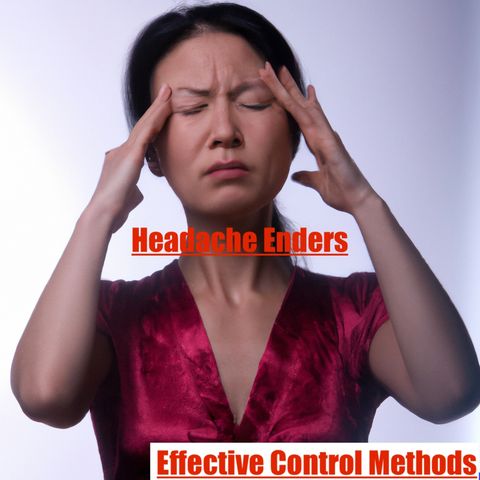Headache Enders! Effective Control Methods

Download and listen anywhere
Download your favorite episodes and enjoy them, wherever you are! Sign up or log in now to access offline listening.
Headache Enders! Effective Control Methods
This is an automatically generated transcript. Please note that complete accuracy is not guaranteed.
Description
Headaches, those pesky throbbing pains in the head, are a common affliction that affects people of all ages. They can range from mild and infrequent to severe and debilitating, significantly...
show more- Primary headaches are not caused by another underlying medical condition and are the most common type. They include:
- Tension headaches: The most prevalent type of headache, characterized by a tight or pressing sensation around the head. They are often triggered by stress, muscle tension, or poor posture.
- Migraine headaches: Characterized by severe, throbbing pain, often on one side of the head, accompanied by nausea, vomiting, and sensitivity to light and sound. Migraines can be triggered by various factors, including hormonal changes, stress, dietary triggers, and certain medications.
- Cluster headaches: Intense, one-sided headaches that occur in clusters, with several attacks occurring daily for weeks or months, followed by periods of remission. Cluster headaches are often accompanied by eye watering, nasal congestion, and restlessness.
- Secondary headaches are caused by an underlying medical condition, such as:
- Sinus headaches: Caused by inflammation or infection of the sinuses, resulting in pain and pressure in the face and forehead.
- High blood pressure headaches: Caused by a sudden rise in blood pressure, characterized by a throbbing pain at the back of the head.
- Caffeine withdrawal headaches: Experienced by regular caffeine consumers who abruptly stop their intake. These headaches are characterized by a dull, aching pain throughout the head.
- Over-the-counter (OTC) pain relievers: OTC medications like ibuprofen (Advil, Motrin) and acetaminophen (Tylenol) are often effective in relieving mild to moderate headaches.
- Prescription medications: For more severe or persistent headaches, prescription medications may be necessary. These include triptans for migraines, anticonvulsants for cluster headaches, and antidepressants for chronic headaches.
- Non-pharmacological approaches: Lifestyle modifications and non-pharmacological treatments can also be helpful in managing headaches. These include:
- Stress management: Reducing stress through techniques like yoga, meditation, or deep breathing can help prevent or reduce the frequency of tension headaches and migraines.
- Regular exercise: Regular physical activity can improve overall health and reduce headache frequency.
- Adequate sleep: Maintaining a consistent sleep schedule and ensuring enough sleep can help regulate hormones and reduce headache triggers.
- Dietary modifications: Identifying and avoiding dietary triggers, such as caffeine, alcohol, and certain foods, can help prevent headaches.
- Relaxation techniques: Relaxation techniques like progressive muscle relaxation and biofeedback can help alleviate muscle tension and reduce headache pain.
- Alternative therapies: Some alternative therapies, such as acupuncture and massage, may provide relief for certain types of headaches.
Information
| Author | QP-2 |
| Organization | William Corbin |
| Website | - |
| Tags |
Copyright 2024 - Spreaker Inc. an iHeartMedia Company

Comments